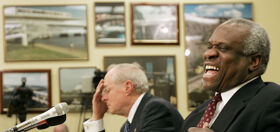 A new report lays out what’s changed in the political landscape over the past decade to allow for so many victories in the battle for same-sex marriage. The Right’s Marriage Message: Talking Tolerance, Marketing Inequality, released by Political Research Associates (PRA), looks at what equality advocates and opponents are doing differently, as well as what external changes have changed the tide. (Hint: President Obama’s support was kind of big.)
A new report lays out what’s changed in the political landscape over the past decade to allow for so many victories in the battle for same-sex marriage. The Right’s Marriage Message: Talking Tolerance, Marketing Inequality, released by Political Research Associates (PRA), looks at what equality advocates and opponents are doing differently, as well as what external changes have changed the tide. (Hint: President Obama’s support was kind of big.)
Among the report’s findings:
* Same-sex marriage opponents downplayed “harm to kids” messaging this election cycle. In 2008, one of the Yes on 8 campaign’s most controversial — and successful — ads was the “Princes” ad, featuring a young daughter expressing excitement over learning in school that she can marry a “princess” someday, to her mother’s shock and dismay. In fall 2012, fewer than half featured “harm to kids” messaging, and often as only a side note to the main theme. In contrast, during California’s 2008 campaign and Maine’s Question 1 campaign in 2009, nearly every anti-LGBTQ advertisement warned voters that legalizing same-sex marriage would force public schools to discuss LGBTQ relationships and sexual behavior with children.
* Instead, a popular theme was the “victims” argument — that same-sex marriage would effectively strip citizens of the right to act according to their religious beliefs. For example, an ad by Protect Marriage Maine featured a couple, Jim and Mary O’Reilly, claiming that they were barred from holding weddings at their inn as a consequence of marriage equality: “A lesbian couple sued us for not supporting their gay wedding because of our Christian beliefs. We had to pay thirty thousand dollars and can no longer host any weddings at our inn.” In fact, the wedding “ban” was voluntary on their part, and resulted from existing state nondiscrimination laws.
* National Organization for Marriage’s (NOM) strategy to use same-sex marriage as a “wedge” issue between the African American and LGBTQ communities failed. As revealed in internal documents, NOM had sought to “find, equip, energize and connect African American spokespeople for marriage… [and] provoke the gay marriage base into responding by denouncing these spokesmen and women as bigots.” Yet come Election Day, Maryland exit polls showed African Americans – who comprise 30 percent of that state’s population — supported same-sex marriage by 46 percent. Moreover, according to national exit polls, African Americans supported their state legalizing same-sex marriage by 51 percent, compared to 47 percent of whites.
* Same-sex marriage supporters had several broader advantages which they lacked in previous campaigns, including: the endorsement by a sitting U.S. president, and the support of three of the four governors whose states had referenda on the ballot; a notable silence from high-level political voices on the Right; and improved fieldwork.
Activist David Dodge, who authored the story, is keen to point out that though we’ve come farther faster than ever before, but that none of the victories came easy. “NOM and its right-wing affiliates will not concede future battles simply because they are unaccustomed to electoral defeat,” said Dodge. “Rather, these groups will learn from their mistakes in order to prepare for future campaigns, several of which are just around the corner in states including Indiana and Oregon.”



















jwrappaport
Sex Cauldron? I thought they closed that place down.
2eo
@jwrappaport: You win best reference of the day. Also another classic moment from the character in question. One of my personal funniest clips ever.
http://www.youtube.com/watch?v=jR7m-4Vc3MU
jwrappaport
@2eo: I’ll be honest – I always liked Worker and Parasite.
Scott Rose
Couldn’t Ruth Bader Ginsburg just melt Maggot Gagginwhore by throwing a bucket of water over her?